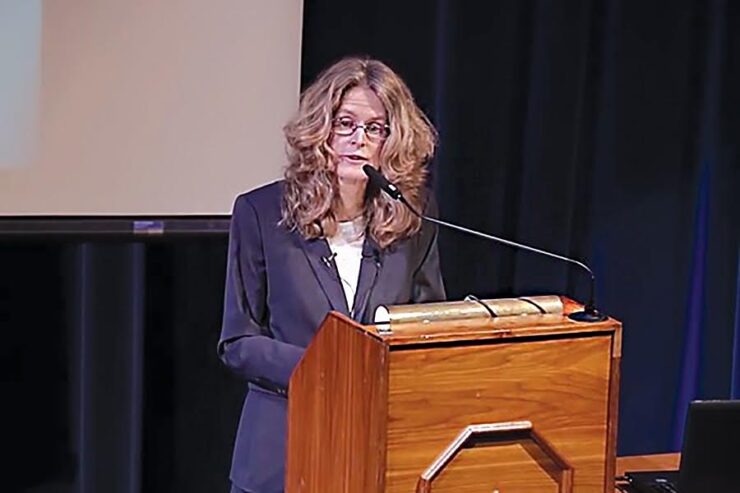Some say the policy doesn’t go far enough, others argue there is no free speech crisis at all
In late August, premier Doug Ford’s provincial government announced via a press release that they are mandating a free speech policy for colleges and universities across Ontario.
Colleges and universities will have until Jan. 1, 2019, to develop, implement, and comply with a free speech policy that meets a minimum standard prescribed by the government.
The press release explains that post-secondary institutions must include in their individual policies the key aspects of the University of Chicago’s Statement of Principles of Free Expression as a baseline.
Among these principles is the idea that post-secondary institutions “should be places for open discussion and free inquiry,” and members of the university or college “may not obstruct or interfere with the freedom of others to express their views.”
The press release adds that policies must “ensure that hate speech, discrimination, and other illegal forms of speech are not allowed on campus.”
The U of O’s approach
When contacted for comment and clarification on its policy, the U of O directed the Fulcrum to a press release from Daniel Woolf, chair of the Council of Ontario Universities (COU).
The COU release states that they will “work with the government and other stakeholders to ensure that freedom of expression is alive and healthy.”
In a recent Board of Governors meeting held on Sept. 24, U of O president Jacques Frémont provided some clarification on the fate of the policy on campus.
Frémont said the U of O will adopt the policy by the January 2019 deadline using the provincial government’s press release as a guideline, and noted the university has been in contact with the Association of Professors of the University of Ottawa, who are “on the same page.”
However, Frémont added, a free speech policy is especially difficult for the U of O to enact, since neither the university’s administration nor the Student Federation of the University of Ottawa (SFUO) currently have a code of conduct in place. Also, he said, the university has fewer restrictions on students than other universities.
Nonetheless, the U of O’s current policies have been criticized by some.
The Campus Freedom Index, compiled by the Justice Centre for Constitutional Freedoms, gave the university an ‘F’ for “not having a clearly stated commitment to free speech” or an “anti-disruption policy.”
Mixed reviews
Students and faculty members across Ontario universities expressed various opinions when it comes to the details of the provincial government’s policy.
David Millard Haskell, a digital media and journalism professor at Waterloo’s Wilfred Laurier University, said the Ford government “made an excellent first step toward making free expression more tenable on university campuses.”
But this is the smallest of steps, Haskell added, because “universities have become so hostile in general to free expression.”
He said that the policy does not address what he calls the “larger problem”: free speech inside the classroom and the lecture hall.
“We do not have professors who are willing to entertain a diversity of opinion,” he said.
Haskell said he also believes that current provincial security policies, often enacted during controversial talks and events on post-secondary campuses, fall short.
The U of O’s policy on the use of facilities and services gives the university discretion in setting security fees. The university has “the right to determine the number of security guards required (for an event), with costs to be covered by the user,” according to the policy.
Haskell said that policies such as this are a “tax on free speech,” adding that Ford’s policy does not address this issue explicitly.
Elijah Bedassie, a third-year philosophy and political science student and president of the University of Ottawa Students for Free Speech also wants the policy to go further.
“My biggest gripe with the policy is that (Ford) didn’t go after the student unions,” Bedassie said. “It is not the universities that are doing all the censorship. They do some of it, but the vast majority is through the student unions. They’re the ones banning the clubs they do not like.”
Bedassie said that time will tell whether the new policy will work for the U of O, but notes that the university has been “pretty good with handling the (SFUO), so maybe they’ll be pretty good with handling free speech too.”
Cara Tierney, a history and art professor at the U of O, said that free speech is definitely important, but is not necessarily being threatened either.
Free speech “is not in danger on university campuses” and Ford’s policy is just “an obvious way to pander to get votes,” they said.
Tierney added that universities already have policies in regard to freedom of expression.
Hate speech or free speech?
After talking to students and academics about whether or not the Ford policy is even warranted, a more complicated conversation emerged: the line between free speech and hate speech.
While Ford’s press release states that colleges and universities must protect against hate speech, the release does not define the complex term.
For Tierney, who identifies as gender-neutral, questioning things like gender pronouns is “an entirely healthy and appropriate thing to do.”
“The university is exactly where we need to have these conversations,” they said. But, “if that questioning turns into discriminatory behaviour, or if a student is continually refusing to recognize my identity, then I (will) take it to the Human Rights Tribunal of the university.”
Tierney added that hate speech is “contextual” and depends on one’s intentions.
“If certain ideas are rooted in the oppression of other people’s rights and existence, then that is something that we need to be quite vigilant about.”
Bruce Pardy, a Queen’s University law professor, helped to clarify what “hate speech” actually means.
According to Pardy, “hate speech” in the Criminal Code of Canada requires the willful promotion of hatred for which the threshold is very high.
“You wouldn’t expect any kind of academic conversation to get anywhere near that threshold,” Pardy said. “If you are talking about controversial theories or findings or ideas in an academic context, that is not going to constitute hate speech. Not in any way.”
Pardy notes that the laws of the land that govern speech automatically apply to universities as they do everywhere else. Universities do not need speech policies to make this the case, and in fact would be unable to exempt their campuses from these laws even if they wanted to.
“None of the laws in the books prohibit speech simply on the basis that they happen to offend somebody,” he said. “Freedom of speech means the ability to say things that some may find offensive and all controversial ideas are going to be offensive to somebody.”
Pardy said that two specific restrictions on free speech, stipulated in provincial and federal law, are defamation and speech that calls for assault or is a threat of physical violence.
However, Tierney is firm that even the term physical violence is ambiguous. They said that universities should take into account that “verbal violence can produce great trauma which can have physical effects.”
Whether Ford’s policy will ensure free speech and protect against hate speech remains to be seen.
As Bedassie said, “time will tell.”
Kevin Geenen is a member of the University of Ottawa Campus Conservatives.
This article has been updated to clarify Pardy’s statements on provincial and federal law on free speech.





